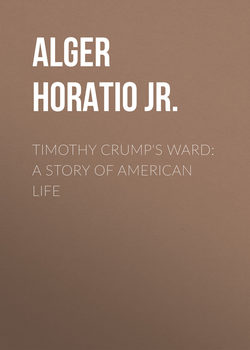Читать книгу Timothy Crump's Ward: A Story of American Life - Alger Horatio Jr., Thomas Chandler Haliburton - Страница 6
CHAPTER VI. WHAT THE ENVELOPE CONTAINED
ОглавлениеTHE card which had been handed to Timothy Crump contained the name of Thomas Merriam,–Wall Street. Punctually at twelve, the cooper reported himself at the counting-room, and received a cordial welcome from the merchant.
“I am glad to see you,” he said. “I will come to business at once, as I am particularly engaged this morning. Is there any way in which I can serve you?”
“Not unless you can procure me a situation, sir.”
“I think you told me you were a cooper.”
“Yes sir.”
“Does this yield you a good support?”
“In good times it pays me two dollars a day. Lately it has been depressed, and for a time paid me but a dollar and a half.”
“When do you anticipate its revival?”
“That is uncertain. It may be some months first.”
“And, in the mean time, you are willing to undertake some other employment?”
“Yes, sir. I have no objection to any honest employment.”
Mr. Merriam reflected a moment.
“Just at present,” he said, “I have nothing to offer except the post of porter. If that will suit you, you can enter upon the duties to-morrow.”
“I shall be very glad to take it, sir. Anything is better than idleness.”
“Your compensation shall be the same that you have been accustomed to earn by your trade,—two dollars a day.”
“I only received that in the best times,” said Timothy, conscientiously.
“Your services will be worth it. I will expect you, then, to-morrow morning at eight. You are married, I suppose?”
“Yes, sir. I am blessed with a good wife.”
“I am glad of that. Stay a moment.”
The merchant went to his desk, and presently returned with a scaled envelope.
“Give that to your wife,” he said.
The interview terminated, and the cooper went home, quite elated by his success. His present engagement would enable him to bridge over the dull time, and save him from incurring debt, of which he had a just horror.
“Just in time,” said Mrs. Crump. “We’ve got an apple-pudding to-day.”
“You haven’t forgotten what I like, Mary.”
“There’s no knowing how long you will be able to afford puddings,” said Aunt Rachel. “To my mind it’s extravagant to have meat and pudding both, when a month hence you may be in the poor-house.”
“Then,” said Jack, “I wouldn’t eat any.”
“Oh, if you grudge me the little I eat,” said his aunt, in severe sorrow, “I will go without.”
“Tut, Rachel, nobody grudges you anything here,” said her brother, “and as to the poor-house, I’ve got some good news to tell you that will put that thought out of your heads.”
“What is it?” asked Mrs. Crump, looking up brightly.
“I have found employment.”
“Not at your trade?”
“No, but at something else, which will pay equally well, till trade revives.”
Here he told the story of the chance by which he was enabled to serve Mr. Merriam, and of the engagement to which it had led.
“You are, indeed, fortunate,” said Mrs. Crump. “Two dollars a day, and we’ve got nearly the whole of the money that came with this dear child. How rich we shall be!”
“Well, Rachel, where are your congratulations?” asked the cooper of his sister, who, in subdued sorrow, was eating her second slice of pudding.
“I don’t see anything so very fortunate in being engaged as a porter,” said Rachel, lugubriously. “I heard of a porter, once, who had a great box fall upon him and crush him; and another, who committed suicide.”
The cooper laughed.
“So, Rachel, you conclude that one or the other is the inevitable lot of all who are engaged in this business.”
“It is always well to be prepared for the worst,” said Rachel, oracularly.
“But not to be always looking for it,” said her brother.
“It’ll come, whether you look for it or not,” returned his sister, sententiously.
“Then, suppose we spend no thoughts upon it, since, according to your admission, it’s sure to come either way.”
Rachel pursued her knitting, in severe melancholy.
“Won’t you have another piece of pudding, Timothy?” asked Mrs. Crump.
“I don’t care if I do, Mary, it’s so good,” said the cooper, passing his plate. “Seems to me it’s the best pudding you ever made.”
“You’ve got a good appetite, that is all,” said Mrs. Crump, modestly.
“By the way, Mary,” said the cooper, with a sudden thought, “I quite forgot that I have something for you.”
“For me?”
“Yes, from Mr. Merriam.”
“But he don’t know me,” said Mrs. Crump, in surprise.
“At any rate, he asked me if I were married, and then handed me this envelope for you. I am not quite sure whether I ought to allow gentlemen to write letters to my wife.”
Mrs. Crump opened the envelope with considerable curiosity, and uttered an exclamation of surprise, as a bank-note fluttered to the carpet.
“By gracious, mother,” said Jack, springing to get it, “you’re in luck. It’s a hundred dollar bill.”
“So it is, I declare,” said Mrs. Crump, joyfully. “But, Timothy, it isn’t mine. It belongs to you.”
“No, Mary, it shall be yours. I’ll put it in the Savings Bank for you.”
“Merriam’s a trump, and no mistake,” said Jack. “By the way, father, when you see him again, won’t you just insinuate that you have a son? Ain’t we in luck, Aunt Rachel?”
“‘Pride goes before destruction, and a haughty spirit before a fall,’” said Rachel.
“I never knew Aunt Rachel to be jolly but once,” said Jack, under his breath; “and that was at a funeral.”
